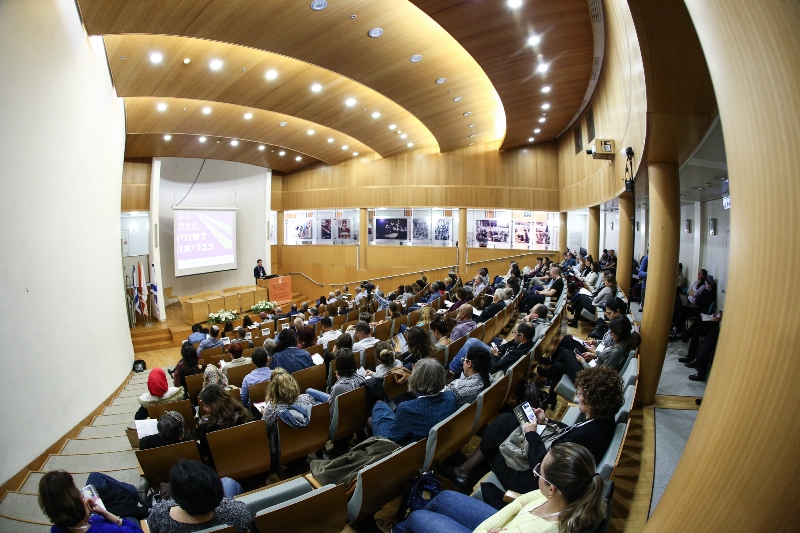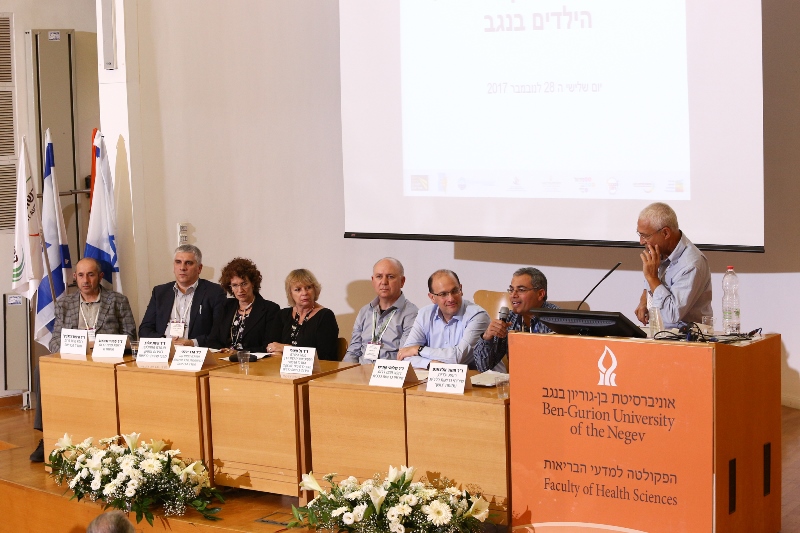There are significant gaps between health indices in the Negev and those in the center of the country. In recent years, several welcome changes have been made (such as personnel incentives, expansion of manpower training in the health professions, support for health funds who have invested in closing the gaps, adding a periphery factor to the formula to allocate funds, government decisions, including the establishment of an additional medical center in the Negev while strengthening Soroka University Medical Center, etc.). However, there are still many gaps and there is need to examine creative ways to strengthen the health system in the Negev in order to promote health amongst the population.
The Fifth Mitzpe Conference for Health Equality in the Negev, organized by Prof. Nadav Davidovitch, Dr. Keren Dopelt and Prof. Gabi Ben-Nun from the Department of Health Systems Management together with the Faculty of Health Sciences' Negev Health Forum, the Negev Development Authority, the Merage Foundation and the Jewish Federations in Israel, was dedicated this year to children's health In the Negev, with a focus on early childhood prevention services in public health, child development and the unique needs of children in Bedouin society. Similar to previous conferences, preparation for this year's conference included preliminary work on selected topics by working groups. All the bodies involved took part, from various government ministries, local authorities, health care providers, representatives of Jewish Federations in Israel, academia and civil society. The papers ultimately presented at the conference were position papers with practical recommendations on topics discussed, in order to present them to senior health care officials in Israel and the relevant government agencies.

Chairman of the Knesset Committee on Labor, Welfare and Health, MK Eli Elalouf pledged at the conference to establish a subcommittee for health in the Negev, chaired by MK Meir Cohen (who was also one of the founders of Mitzpe Conference when he was Mayor of Dimona) that will integrate members of the Mitzpe conference's steering committee. The committee will follow-up on those government decisions concerning health not yet implemented, with an emphasis on children's health. MK Shuli Moalem Refaeli made a commitment that there would be a discussion of the Committee's recommendations in the Knesset's health forum. The Mayor of Yeruham called on all parties involved in the health field and on the general public in the Negev to protest on the existing gap in health infrastructures in the Negev in contrast with other parts of the country.

Key recommendations for advancing the health of children in the Negev:
1. A national authority for preventative care is needed: The children's preventative health care authority will function as the central national headquarters for management, coordination, data gathering and operations for public health in Israel, in accordance with the proposed Early Childhood Authority Law. The authority will bring together within a single funded national framework the existing and future infrastructures of infant care and school children's health, including manpower, computing, construction and maintenance.
2. Continued implementation of decisions and recommendations on health: government decisions, The Afek Committee to expand health services in the Negev, Mitzpe Conferences recommendations.
3. Incentives: incorporations of qualitative measurements in children's health, implementation of an incentives model for NICUs in areas of infant care and child development, as well as unique incentives for personnel in the Negev.
4. Personnel: draw expert paediatricians to the Negev by creating a package of training, research, academics and financial incentives that would create professional satisfaction.
5. Combined hospital-community models for operating child healthcare centers: urgent care, nursing, outpatient care, and specialists enable professional growth and centers of excellence combining teaching and academic research.
6. Regulation: setting a standard fee for child development clinics recommended by the Ministry of Health or define a minimum fee for the healthcare providers to negotiate with the units; encourage collaboration between different healthcare providers to benefit small distant settlements and designating the provider's capitation funds for the periphery.
7. Create integrated early childhood centers: develop a unique excellence model in the Negev that can be copied elsewhere to integrate healthcare with other fields (education, welfare) and linked to local authorities.
8. Promote child health using the Heathy Placemaking approach. Continued formation of local "roundtables" to promote an active and health lifestyle in the community; create locally adapted programs and activities related to healthy and active lifestyle for children; form dedicated partnerships for planning and funding projects.
Specific recommendations for child health in the Bedouin population:
1. Personnel: dedicated Arabic speaking personnel, training programs for all health professionals (medicine, nursing, speech therapy, occupational therapy, health promotion, etc.); incentivize health professional working in Bedouin society.
2. Infrastructure: expand the regional campus for education and rehabilitation in Tel-Sheva; create treatment continuity between welfare, education and health (hospital and community) with the involvement of the local authority; strengthen and make accessible child development units; make mobile units (genetics, mammography…) accessible to all Bedouins; develop childcare frameworks for young children to support women wishing to enter labor market, for the same of women and children and to reduce poverty.
3. Cultural adaptation: Arabic speaking professionals, including mediators; inclusion of community members in planning interventions and training; empowerment of the community, especially women, and provision of appropriately adapted tools.
4. Education and health promotion: promoting healthy lifestyle with emphasis on nursing, wise nutrition, physical activity, smoking prevention; guidance for parents on topics of parenting, health and safety; changing habits and adoption of behaviors that will reduce accidents and illnesses.
5. Reduce congenital defects and infant mortality: renew the project to reduce infant mortality in the Bedouin population; develop a genetic matching model in collaboration with community leaders and religious leaders; expansion and increased accessibility of genetic services; reinforce school programs about the causes of genetic diseases; development of a 'genetic chip' adapted to the Bedouin population; introduction of PGD testing and expansion of placenta CC testing; encourage women to have pregnancy tracking.
6. Reduce child accidents at home in the Bedouin population by formulating a national plan and dedicating funding for that purpose.